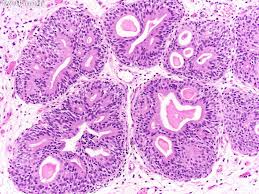Is Glandular Cystitis a Precancerous Lesion?
Date:2019-09-09 click:0
At present, most scholars believe that although glandular cystitis is a benign lesion, it is a precancerous lesion with malignant potential and may progress to cancer. Low-risk glandular cystitis should not be considered as a precancerous lesion, but chronic irritants may develop into high-risk type if they persist. The high-risk type has the possibility of malignant transformation in a short time and should be considered as a precancerous lesion.

Measures to reduce the recurrence rate and canceration rate:
1. Best treatment
Nowadays, most scholars believe that glandular cystitis is a benign lesion with the possibility of malignant transformation, so they advocate active treatment. At present, the best treatment for glandular cystitis is transurethral plasma resection with bladder instillation chemotherapy. According to the latest research reports at home and abroad, the recurrence rate can be reduced to 6%-7%, and the cancer rate can be reduced to less than 1%.
2. Changing Bad Living Habits
Don't hold in urine, avoid playing cards, stimulating food (spicy, barbecue, hot pot), drinking strong tea, alcohol, and smoking. What you need to do is drink more water and exercise more.
3. Keeping a Balanced Diet
Patients should keep a light diet, eat more vegetables and diuretic fruits (watermelon, pear, pineapple, avoid litchi, pitaya, citrus, and other fruits), eat more fish, chicken and other low-protein foods.

4. Keeping a Positive Mind
Don't be overjoyed or sad, and you should unload the psychological burden, take part in more outdoor activities that are good for your body and mind, and pay more attention to positive things.
5. Attention to the Environment
Avoid exposure to toxic gases (volatile gases of chemical dyes, formaldehyde, secondhand smoke). Do not contact radioactive substances (mobile phones, power stations, welding, microwave ovens, etc.) for long periods of time.
6. Do Not Take Drugs on Your Own
Don't take antidepressants and other psychotropic drugs or antibiotics at will.
7.Postoperative Rehabilitation


One month after operation: Don't run fast, hold the baby, go upstairs and downstairs quickly, wash clothes by hand, climb mountains, carry heavy things on shoulders and backs, etc. You can only take a slight walk, rest more, drink more water, and exercise less.
1-3 months: Do the laundry, cooking, take a fast walking, an appropriate increase in exercise, avoid carrying heavy things on the back.
More than three months: general activities are acceptable.
In a word, if the cystoscopy biopsy showed glandular cystitis, it is suggested that patients should be treated as early as possible. The earlier the treatment you take, the better the effect will be, and the lower the recurrence rate and canceration rate is. If glandular cystitis is not treated, the recurrence rate can reach 50%-60%, and the canceration rate can reach 3%-4%.
Glandular cystitis is prone to recurrence and has the tendency of malignant transformation. Cystoscopy should be performed every 3-6 months after the operation to detect recurrence and malignant transformation in the early stage. Recurrent cases were confirmed by pathological diagnosis, excluding malignant transformation, and treated as the primary lesion.

Multiple electrosurgical resections were feasible. But the damage of surgical treatment to the health of men should not be underestimated. Therefore, patients after surgery should take Diuretic and Anti-inflammatory Pill to consolidate the curative effect after surgery. It has no side effects through reasonable and strict compatibility. Therefore, for patients with glandular cystitis after surgery, taking conservative herbal medicine to promote the recovery will not cause secondary harm to the body, but also can enhance the immunity.



